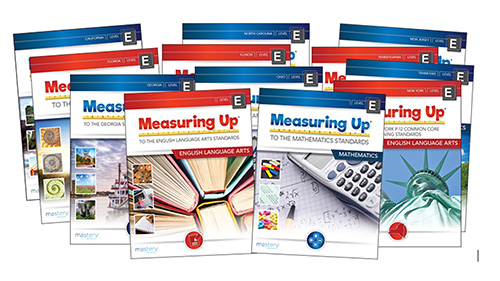From Scores to Action: Turning Diagnostic Results into Daily Routines
When the test results come in, teachers face the same key question: Now what? Turning diagnostic data into targeted instruction can seem...
AP & Honors Mathematics
Explore Wiley titles to support both AP and Honors mathematics instruction.
Literacy Skills & Intensive Reading
Connections: Reading – Grades 6–12
Empower student success with a proven intensive reading program that develops strong reading skills in striving readers.
Drama, Speech & Debate
Basic Drama Projects 10th Edition
Build students’ confidence and competence with comprehensive, project-based theatre instruction.
Literature
Connections: Literature
Support learners as they study dynamic, relevant texts and bring the richness of diverse voices to students through literature.
Literature & Thought
Develop critical thinking, reading, and writing across literacy themes, genres, historical eras, and current events.
Language Arts
Vocabu-Lit® – Grades 6–12
Help students build word power using high-quality contemporary and classic literature, nonfiction, essays, and more.
Connections: Writing & Language
Help students develop grammar, usage, mechanics, vocabulary, spelling, and writing and editing skills.
Reading/English Language Arts
Measuring Up to the English Language Arts Standards
Incorporate standards-driven teaching strategies to complement your ELA curriculum.
English Language Learners
Measuring Up for English Language Learners
Incorporate research-based best practices for ELLs with an approach that includes a focus on language acquisition strategies.
Mathematics
Measuring Up to the Mathematics Standards
Incorporate standards-driven teaching strategies to complement your mathematics curriculum.
Foundations
Measuring Up Foundations
Help students master foundational math skills that are critical for students to find academic success.
Science
Measuring Up to the Next Generation Science Standards
Give students comprehensive NGSS coverage while targeting instruction and providing rigorous standards practice.
Assessment
Measuring Up Live
Deliver innovative assessment and practice technology designed to offer data-driven instructional support.
For a better website experience, please confirm you are in:
1. Does each student have a personalized learning plan?
The most effective instruction is directed by individual student’s strengths and needs. Collecting and using data is foundational to knowing students well enough to create a personalized plan for them. Assessment technology can be a fast and accurate way to get baseline data—and identify learning gaps.
2. Do your resources support your intervention goals?
Having a variety of resources is also key to keeping intervention fresh and on point.
Measuring Up Foundations hones in on the foundational skills students require for grade-level learning. Organized for easy use, the clean-page format and streamlined instruction helps students to focus and stay on task. Technology can help too. Measuring Up Live 2.0 offers educators the ability to assess quickly and effectively. The integrated system also provides practice ensuring that students are working on the precise skills they need for mastery.
3. Does your instruction build the necessary foundational skills for grade-level learning?
Struggling students often have gaps in foundational skills needed for grade-level learning. Rather than going back a year “just in case,” the Council of Great City Schools (2020) suggests accelerating learning with “just-in-time” teaching—teaching foundational skills in small groups as they are needed for grade-level learning.
4. Do you respond quickly to changing needs?
Reaction time matters. The quicker the response time, the less likely a student will fall behind. Effective educators alter instruction, ask questions, think aloud, model, and provide scaffolds according to students’ needs. Teachers support and monitor practice, so time spent independently is purposeful and productive.
Conclusion
So, how does your intervention instruction measure up? (No pun intended!) It’s never too late to adjust our practices-especially when achievement is at stake. Addressing learning challenges take time. It also takes dedicated educators and resources working together to ensure student achievement.

When the test results come in, teachers face the same key question: Now what? Turning diagnostic data into targeted instruction can seem...

Assessments are only as powerful as what we do with the results.

December is a unique month in the classroom. Energy is high, schedules are unpredictable, and instructional time can feel fragmented. But it’s also...

Discover innovative and impactful strategies to honor student achievements and foster a culture of reflection and growth in K–12 classrooms.

Every spring, standardized testing can feel like a looming mountain for both students and teachers. The challenge is real: how do we prepare students...

A key challenge for educators is finding a way to customize and differentiate learning for each student in their classrooms. Teachers need tailored...

As winter benchmarking wraps up, teachers face the question: now what? The data is in, but turning numbers into meaningful spring growth plans is...

National Dropout Prevention Center’s evaluation of Measuring Up reveals students experienced substantial academic progress

Having a comprehensive and well-designed curriculum at your fingertips will go a long way toward creating summer enrichment activities that engage...

Spring is in the air, and school children all across the nation are entering the last leg of the academic year. But before the final bell rings, many...

Taking high-stakes assessments can be a stressful experience for students. But the right practice tools can help alleviate the pressure and even make...

